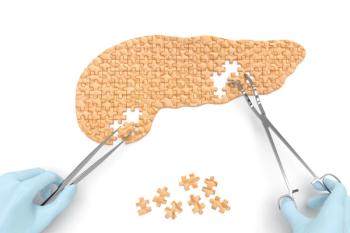
Assessing, Implementing Geriatric Oncology Model of Care for Lung Cancer Patients
Geriatric screening and assessment have not been widely used, despite international society recommendations for screening older patients with cancer.
Following the introduction of a new geriatric oncology model of care (GOMOC), implementation and evaluation were not fully acceptable or feasible, according to the predefined measures of success in a study published in the Journal of Geriatric Oncology.1
Older populations are often underrepresented in clinical trials, including those for cancer treatment. Guided interventions, assessments, and screening may improve the quality of life and health care delivery in geriatric oncology patients; however, despite international studies recommending screening older patients with cancer, screening and assessment of this patient population is not often done. A team of investigators in Australia conducted an investigation implementing and evaluating a GOMOC for older patients with lung cancer.
The investigation was conducted at Liverpool Hospital, a university-affiliated hospital with a comprehensive cancer center, for 12 months. Eligible participants were those with a new diagnosis of lung cancer who were ages 70 years or older; were due to receive systemic therapy alone, radiotherapy alone, or a combination of both; and had a Clinical Frailty Scale (CFS) score ≥5. The electronic geriatric 8 (G8) tool was used for screening by oncologists to autogenerate a referral to patients who has a G8 score ≤14.
Eligible participants who were included in the study were referred for a comprehensive assessment at the Multidisciplinary Aged Car Caner Service (MACCS) clinic every 2 weeks. Appointments at the MACCS clinics included meetings with physiotherapists, occupational therapists, and geriatricians. Nursing resources were not used to support this clinic.
The investigators defined successful acceptability and feasibility of GOMOC to be ≥80% within 12 months. They defined acceptability as “the new model of care is acceptable to stakeholders as measured by their direct experience with the various dimensions of what is implemented.” Model acceptability included participating oncologists stating that they can implement G8 screening in routine clinical care and that MACCS referrals would be added into the existing resources for current geriatric outpatient clinics.
The researchers defined feasibility as “the extent to which the model of care can be successfully carried out” and noted that these measures were subject to change over time. Feasibility in this case included a proportion of eligible patients who were screened with the G8 tool, a proportion of patients who were identified as frail (G8 score ≤14) who underwent MACCS review, letters of referral to MACCS geriatrician, documentation of discussion in the geriatric oncology multidisciplinary team meeting, and letters from the MACCS geriatrician to the oncologist and general practitioner.
Of the 122 identified geriatric patients with a new diagnosis of lung cancer, 69 patients were screened; 51 patients met the criteria for MACCS referral, but only 30 patients were assessed due to either geriatric leave (n=5), failure to attend (n=4), declined assessment (n=1), cancellation because of treatment changes (n=4), hospital admission (n=4), death of the patient (n=2), or an unknown reason (n=1) . The geriatrician assessed 29 patients, the physiotherapist assessed 26 patients, and the occupational therapist assessed 26 patients.
Of the 30 assessed patients (median age, 77.5 years), 63% were male, 29 had lung cancer, and 1 patient had mesothelioma. The median time from the oncology clinic appointment to the MACCS clinic was 20 days; 19 patients were seen before treatment commencement and 10 were seen after, while 1 patient did not receive treatment.
New cognitive issues were diagnosed in 7 patients, 2 patients were diagnosed with reactive depression, and nearly all patients were diagnosed with a mild (n=9), moderate (n=9), or severe (n=11) comorbidity. A new comorbidity was diagnosed in 16 patients and medication changes were recommended for 25 patients.
All patients were discussed in the GOMOC multidisciplinary team meeting and a geriatrician MACCS letter was sent to the general practitioner for 29 patients to be seen, after which 27 patients proceeded with the planned treatments.
Of the 4 oncologists, 3 (75%) noted that they could integrate the G8 screening into their routine clinical practice; therefore, the GOMOC did not meet the study’s requirements for acceptability. In contrast, the geriatrician and health staff all agreed to be able to conduct the GOMOC within the existing resources. “In term of feasibility, the 80% criteria for success was met for proportion of eligible patients screened (85%), referral letters to MACCS geriatrician (100%), letters from MACCS geriatrician to oncologists and GP (100%), and documentation of geriatric oncology MDM discussion (93%), but not met for proportion of frail patient undergoing MACCS review (59%),” the authors noted.
The multidisciplinary and holistic care, which involved allied health staff, such as in the multidisciplinary team meeting, was noted to be one of the strengths of the GOMOC. The streamlined documentation and referral process was another highlighted strength. However, limitations, such as the single institutional nature in a publicly-funded health system, may hinder the applicability to other jurisdictions.
“Moving forward, we will be designing and implementing a nurse led GOMOC for older patients with lung cancer,” the investigators noted. “This will be co-designed with consumers and current GOMOC staff. All patients will continue to be presented at the geriatric oncology MDM to tailor management according to the assessments performed.”
Reference
1. Vinod A, Khoo A, Berry M, et al. Implementation and evaluation of a geriatric-oncology model of care for older adults with lung cancer. J Geriatric Oncol. Published online July 6, 2023. doi:10.1016/j.jgo.2023.101578
Newsletter
Pharmacy practice is always changing. Stay ahead of the curve with the Drug Topics newsletter and get the latest drug information, industry trends, and patient care tips.























